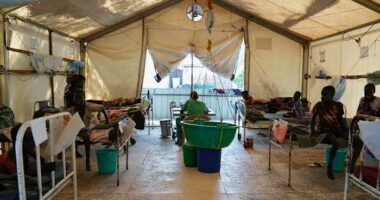Share this @internewscast.com

APPLING, Ga. () – In light of this weekend’s tragic shooting, local law enforcement officials are emphasizing the crucial need to tackle mental health challenges both locally and nationwide.
Columbia County Sheriff Clay Whittle is advocating for increased measures to address mental health concerns, especially after witnessing multiple violent incidents in recent times.
Psychologists I talked to are saying the same.
“Regrettably, this is an everyday reality for law enforcement. Mental health issues are widespread in our nation, and no effective measures are being implemented to address the situation,” stated Whittle.
That’s what the Sheriff told reporters at a press conference Sunday afternoon after Deputy Gavin White was sent to the hospital, and Deputy Brandon Sikes was killed over the weekend.
“The officers are serving the community and trying to just go to work like the rest of us, and doing their job to protect the community. Whenever there’s a loss of life or serious injury it’s a tragedy,” said Augusta University Psychiatry Professor, Dr. Christopher Drescher.
Drescher says a large portion of people with mental health disorders never receive treatment.
One of the big reasons why is because of the lack of resources around the Peach State.
“You look across Georgia, and there’s a lot of counties that don’t even have a psychiatrist or a psychologist. Many that are underserved even in areas that feel more like medical hubs—like Augusta—there are still pockets around the CSRA that do not have access to regular mental health care,” said Drescher.
Law enforcement in our area have had discussions about the need to address this issue, but psychologists say it goes beyond when a tragedy happens.
“Whenever there’s a high profile event like this—a tragedy—there’s a lot of attention that gets put onto mental health, and how things could have been prevented. But, there’s also so many day events when people are a threat to their own safety, or safety to other people in their home and their family,” Drescher said. “Those can be related to mental health, and building up the infrastructure is a really effective way to try to prevent those type of events that we don’t necessarily hear about or read about, but have a huge impact on individuals lives.”
The Sheriff also spoke about bringing back mental health facilities, like the impatient hospital that was once in Milledgeville, Georgia.
Drescher says while that is an option, reaching people where they are could be even more effective.
“We need crisis teams that can go out and assist people not only in the moment, but in their community. We need the ability to have high-quality, evidence-based services that serve people in their homes in the least–restrictive environment, that way we can prevent people needing to be in high-cost situations like a psychiatric facility, and removed from their family’s lives and communities,” said Drescher.
“This kind of mental health issue is not a place for jail, and it’s not a place for homeless people on the street. It’s a place that needs to be addressed by the medical community and our elected officials that fund those types of things here in the state of Georgia, and across the entire nation,” said Whittle.
May is also Mental Health Awareness Month.
Augusta University is one place that has resources available—-to find that information, click here.










